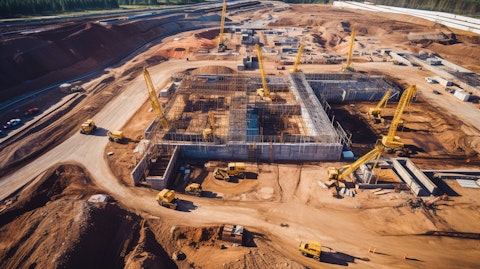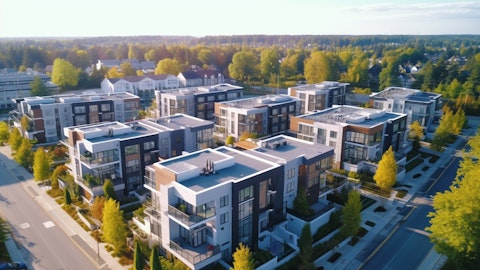Southland Holdings, Inc. (NYSE:SLND) Q2 2024 Earnings Call Transcript August 13, 2024
Operator: Good morning. My name is Nicole, and I will be your conference operator today. At this time, I would like to welcome everyone to the Southland Second Quarter 2024 Earnings Conference Call. All lines have been placed on mute to prevent any background noise. After the speaker’s remarks there will be a question-and-answer session. [Operator Instructions] Thank you. Alex, you may begin.
Alex Murray: Good morning, everyone, and welcome to the Southland second quarter 2024 conference call. This is Alex Murray, Director of Corporate Development and Investor Relations. Joining me today are Frank Renda, President and Chief Executive Officer; and Cody Gallarda, Executive Vice President and Chief Financial Officer. Before we begin, I’d like to remind everyone that this conference call may contain forward-looking statements within the meaning of Section 27A of the Securities Act of 1933, Section 21E of the Securities Exchange Act of 1934, and the Private Securities Litigation Reform Act of 1995. Forward-looking statements are neither historical facts nor assurances of future performance. Forward-looking statements are uncertain and outside of Southland’s control.
Southland’s actual results and financial condition may differ materially from those projected forward-looking statements. Therefore, you should not rely on any of these forward-looking statements, and we do not undertake any duty to update these statements. For a discussion of some of the risks that could affect results, please see the Risk Factors section of our Form 10-K for the year ended December 31, 2023, that was filed with the SEC on March 4, 2024, and discussion on Form 10-Q for the quarter ended June 30, 2024, that was filed with the SEC last night. We will also refer to non-GAAP financial measures, and you will find reconciliations in the press release relating to this conference call, which can be found on the Investor Relations page of our website.
With that, I will now turn the call over to Frank.
Frankie Renda: Thank you, Alex. Good morning, and thank you for joining Southland’s second quarter 2024 conference call. We reported mixed results in the second quarter with revenue of $252 million, down from $257 million last year. We reported a gross loss of $40 million, which compares to a gross loss of $34 million in the same period last year. Despite the challenges in the quarter, we had several positive leading indicators, including strong cash flow from operations of $27 million and new awards of $375 million in the strong bidding environment we’ve discussed in prior quarters. Our second quarter’s income statement was negatively impacted by unfavorable adjustments of $40 million from the decision to settle disputes on legacy projects.
While we were disappointed by the impact this had on our results this quarter, we will significantly strengthen our balance sheet by collecting $58 million from these disputes in the third quarter. This is in addition to the strong positive cash flow from operations of $27 million in the second quarter. Earlier this year, on our fourth quarter 2023 conference call, I mentioned that we expected to have the opportunity to settle a considerable number of legacy disputes with a focus on generating cash in 2024. Our focus has been to quickly negotiate settlements that accelerate cash collections and minimize the risk and uncertainty associated with prolonged and extensive settlement pursuits. While we are disappointed about having to make the decision to settle for less than we believe that we were entitled to in certain circumstances, it was the best decision for Southland’s long-term outlook.
With the recent dispute settlements and other initiatives to strengthen our balance sheet, we are in a much stronger position today to negotiate our remaining legacy disputes, and we will continue to vigorously pursue all the money that we are owed. We believe there will continue to be opportunities to generate a significant amount of cash from resolving legacy disputes and strong performance in our core business in the coming quarters. Along with strong operating cash generation, we have taken other steps to continue to bolster our balance sheet. This will allow us to pursue more opportunities in our core business. We closed the $42.5 million real estate transaction in July, which resulted in $16 million of debt reduction and approximately $25 million of cash for general corporate purposes.
We also continue to work through a debt refinance which we mentioned on our last call. We will have additional details when this transaction is finalized, which we expect to occur before we report our third quarter results. Challenges persist in our legacy portfolio of projects, but we continue to make operational strides to put this work behind us, and I’ve never been more confident in our core business projects than I am with the work that we have picked up over the past couple of years. We ended the quarter with $2.74 billion of backlog, up from $2.64 billion last quarter. We booked approximately $375 million of new award during the quarter. This included the $202 million Bull Run Filtration Facility in Portland, Oregon, and 3 new water resource projects totaling $150 million.
We are also excited to announce that we have been informed that our team has been selected for phase 2 of the North End Treatment Plant in Winnipeg. The project is being delivered as a progressive design build. We are in active contract discussions with the owner on the preconstruction phase of the contract, which we expect to transition from preconstruction activity into a construction contract by 2026. We expect our portion of the construction contract to be approximately $220 million. None of this amount is included in our second quarter backlog. We are currently working on phase 1 of the program with our partner, Aecon. I would also like to note that we are currently working on the preconstruction phase for the earthquake-ready Burnside Bridge in Portland, Oregon.
The new win on phase 2 of the North End Treatment Plant brings our total pending alternative delivery construction contracts to approximately $500 million, which is not included in our $2.74 billion of backlog today. We have mentioned on previous calls that we are seeing our customers shifting towards alternative delivery contracts like the progressive design builds or construction manager, general contractor models. Alternative delivery methods promote early involvement of the contractor in the design process. We believe collaboration between the owner, designer, and contractor helps in identifying potential issues early and allows us for more informed decision-making throughout the projects. We believe we can provide more innovative solutions and more efficient project execution while decreasing future risk potential.
Alternative delivery contracts typically get awarded based on several factors other than just price, including schedule, resume, and technical score in our proposal. Our extensive technical experience across various markets makes us highly attractive to customers and gives us a true competitive advantage in alternative delivery bids. We believe our resume and over a 120-year history of delivering specialty infrastructure projects will continue positioning us well to win alternative delivery projects in the coming years. Demand across our end markets continue to be very strong, and we believe we will continue to win our fair share of the robust opportunities. The EPA recently updated its Clean Water Infrastructure Needs survey, which estimates that $630 billion is going to be needed to be spent over the next 20 years just to address water quality objectives of the Clean Water Act.

To put this into perspective, the estimate 10 years ago was $271 billion. We are ranked third in water transmission lines and in the top 10 in water supply and water treatment plants by Engineering News-Record Sourcebooks rankings. We are well positioned to help improve North America’s water infrastructure in an environment where there are a few competitors that operate at the scale we do. We have active water projects across the U.S. from Florida all the way to Oregon and several core markets in between. We also have several water resource projects in large metro areas in Canada. There are not many water contractors that have the technical expertise, scale and geographic footprint that we have. This gives us a true competitive advantage to capitalize on these opportunities.
We’re also seeing increased bidding opportunities from the IIJA, which is providing a major tailwind for our pipeline. We’re in the early innings of this impact the Act will have on our results. We believe the IIJA will provide significant opportunities for the next decade, and we are positioning ourselves to capitalize on these opportunities from the IIJA in the near term. We are focused on remaining disciplined in choosing projects that fit our teams very well. We also continue to bid on projects with very limited competition. Given the strong demand, favorable competitive landscape, and improvement in our balance sheet, we are optimistic about the potential for long-term margin expansion as we continue to work through our legacy projects and our newer work with great bid margin continues to come online.
In summary, we faced several challenges this quarter, largely driven by the impact settling legacy disputes had on our income statement. We are encouraged by the cash flow improvement of the business, the strategic actions taken to strengthen our balance sheet, and the substantial backlog and new project awards that position us well for the future. Our focus remains on executing our core business effectively, capitalizing on the opportunities presented by the IIJA and driving long-term margin expansion. With that, I will now turn the call over to Cody for a financial update.
Cody Gallarda: Thank you, Frank, and good morning, everyone. I will provide an overview of our financial performance during the second quarter of 2024. You can find additional details and information in the financial statements, footnotes, and management’s discussion and analysis that were filed on Form 10-Q last night. Revenue for the quarter was $252 million, down $5 million from the same period in 2023. Gross loss for the second quarter was $40 million compared to a gross loss of $34 million for the same period in 2023. Gross profit margin in the quarter was negative 16% compared to negative 13% in the same period of the prior year. Selling, general and administrative costs in the second quarter were $15.7 million, a decrease of $700,000 compared to the same period in 2023.
Interest expense for the quarter was $6.7 million, an increase of $2.4 million compared to the same period in 2023. The difference was attributable to increased borrowing costs and higher debt balances. Income tax benefit was $16 million for the quarter compared to a benefit of $19 million in the same period last year. We expect our 2024 annual effective tax rate to be in the 20% to 24% range, depending on certain tax credits, nondeductible items, and certain state and local taxes. We reported a net loss of $46 million or negative $0.96 per share in the quarter compared to a net loss of $13 million or negative $0.27 per share in the same period last year. We reported an adjusted net loss of $46 million in the quarter or negative $0.96 per share, which compares to an adjusted net loss of $35 million or negative $0.76 per share in the same period last year after removing the noncash benefit from eliminating the contingent earn-out liability and transaction-related expenses in the second quarter of 2023.
In the second quarter, we produced EBITDA or earnings before interest, taxes, depreciation and amortization of negative $49.9 million compared to EBITDA of negative $19.1 million for the same period in 2023. We reported adjusted EBITDA of negative $49.9 million in the quarter, which compares to adjusted EBITDA of negative $42.2 million for the same period in 2023 after removing the noncash benefit from eliminating the contingent earn-out liability and transaction-related expenses in the second quarter of 2023. Now to touch on segment performance for the quarter. Our Civil segment had revenues of $79 million, an increase of $14 million from the same period in 2023. Our Civil segment gross profit was $9 million, an increase of $3 million from the same period in the prior year.
As a percentage of revenue for the quarter, our Civil segment had gross profit margin of 12% compared to 9% in the same period in 2023. For the quarter, our Transportation segment had revenues of $172 million, a decrease of $19 million from the same period in 2023. Our Transportation segment gross loss was $49 million, a decrease from a gross loss of $40 million in the same period the prior year. As a percentage of revenue for the quarter, our Transportation segment had a gross profit margin of negative 29% compared to negative 21% for the same period in 2023. The Materials & Paving business line contributed $9 million to revenue and negative $47 million to gross profit in the second quarter. This was primarily related to unfavorable adjustments of $40 million in connection with dispute settlements that will produce a substantial amount of cash to be collected in the third quarter.
We still anticipate we will be substantially complete with M&P projects by mid-2025. The remaining M&P backlog is just under $200 million or 7% of our total backlog. The unfavorable adjustments of $47 million in the quarter resulted in lowering the percentage of work completed on certain projects. The accounting treatment results in a derecognition of revenue in the current period. This result does not impact the mid-2025 schedule to reach substantial completion on the remaining M&P projects. Our core operating results in the Transportation segment, which exclude Materials & Paving would have been $163 million of revenue and negative $2 million of gross profit for a gross profit margin of negative 1%. We had an unfavorable adjustment on a legacy bridge project in the Midwest, which affected core results by negative $17 million in the quarter.
Consolidated core results in the quarter, which excludes Materials & Paving, would have been $243 million of revenue and $7 million of gross profit for a gross profit margin of 3%. Turning to the balance sheet. As of June 30, 2024, we had net debt of $239 million, inclusive of cash and restricted cash of $69 million. As of June 30, 2024, we reclassified approximately $90 million of debt from long term to short term as our revolving credit facility with Frost Bank matures on April 15, 2025. On August 9, 2024, we executed a term sheet with a new lender that will refinance approximately $110 million of our existing debt into a new long-term facility. We will announce additional details on this new debt structure when the transaction is finalized, which we expect to occur before we announce our third quarter results.
As Frank highlighted, we have made significant strides in strengthening our balance sheet to support the opportunities we see in front of us. We had a strong quarter of cash flow from operations of $27 million driven by our core business. We added $25 million of net proceeds from the real estate transaction, and we will receive $58 million of cash from dispute settlements in the third quarter. And we expect to receive additional proceeds from the debt refinance transaction for which we anticipate closing before we release next quarter’s results. Further, we remain optimistic for the potential significant future cash inflows from disputes and change order settlements that stem from our legacy projects and continued strong performance in our new core projects.
Thank you for your time and interest in Southland. I’ll now pass the call back to the operator for questions.
Q&A Session
Follow Southland Holdings Inc. (AMEX:SLND)
Follow Southland Holdings Inc. (AMEX:SLND)
Receive real-time insider trading and news alerts
Operator: [Operator Instructions] Our first question is coming from Adam Thalhimer from Thompson, Davis.
Adam Thalhimer: Wanted to ask about the Civil segment. Nice sequential increase in backlog there. When does that start to flow into revenue?
Frankie Renda: Yes. I think we’re starting to see more and more on the Civil side. In third and fourth quarter, we expect upticks from the Civil business starting to flow into revenue in those quarters beyond so getting closer on the new work. We also continue to see the business performing really well. Revenue is up 21% from last year in this segment. Margins were up from 9% to 11.5% this year, and the Civil backlog is up 38% from year-end. So all these trends, we expect to start showing revenue in the coming quarters, Adam.
Adam Thalhimer: And then the remaining M&P backlog, do you have any sense — should we just straight-line the recognition of that over the next 4 quarters or does it flow through differently from that?
Cody Gallarda: Adam, it will be heavier weighted towards Q3 and Q4 as we expect some of those remaining projects will be substantially complete by year-end with a small number trailing into 2025. So of that $200 million in backlog left, it’s definitely weighted closer rather than further.
Adam Thalhimer: And then I don’t know how much detail you can give but the $58 million is great news. Just curious if you can touch on the ongoing discussions and the potential for more settlements in the coming quarters.
Frankie Renda: Yes. $58 million helps a lot on claims that we’ve talked about in the past. A lot of these disputes have built up as a result from COVID. A lot of the owners weren’t in the office, and we had to self-finance a lot of these projects through COVID. And we are going to go after all the money we have earned. We’re starting to really make progress on getting to the table on a lot of these claims. We have a mediation with the city of Charlotte, which is one of the larger claims this week and several more as we progress into the back half of the year. Approximately half of our CIE balance is on projects we are substantially complete on. So we believe we’re going to generate a significant amount of cash from these in the coming quarters. I mean, this — the money that we’ve collected is going to allow us to vigorously pursue these claims.
Operator: Our next question will be coming from Christian Schwab from Craig-Hallum Capital.
Christian Schwab: Just for the clarity on the disputed contracts, we talked about maybe $100 million of the $200 million is close to be done, and you mentioned Charlotte. I’m just trying to get an idea of how many projects and how many people do you have to negotiate with for clawbacks for cash on that $200 million? Is it 3 or 4 people, 3 or 4 projects? Is it 8 or 9 projects? I guess that was never really clear.
Cody Gallarda: Yes. We haven’t disclosed the number of projects. We have a handful of claims related to our legacy portfolio. It is a little lumpy. We did disclose additional details about the CityLYNX project that Frank just mentioned. That’s one of the larger funds that we have out there, and we do expect to be at the table to potentially settle those over the next couple of quarters here.
Christian Schwab: So as far as that $200 million, is there any way for us to roughly mack truck, semi-truck the range of cash that we could generate between now and the end of 2025 and that $200 million worth of work?
Cody Gallarda: Yes. So if you look at our contract assets balance, we’ve called approximately $500 million. We shared about half of that is related to claims on projects that are substantially complete. The largest we have out that we disclosed is the $115 million against city of Charlotte. So we do expect that everything that we have recorded, we will convert into cash and we’re going to vigorously pursue these claims.
Christian Schwab: So it sounds like you’re meeting with them shortly, so the lion’s share of of your work done in essence, thanks for that clarity, is in essence just 1 dispute, which we might get clarity on sooner than later, cross our fingers. Is that fair?
Cody Gallarda: We hope and expect so, Christian. We’ve had very favorable developments on each and every one of these claims over the last couple of quarters. We expect for that to continue as owners have now run out of appeal options and are going to have to settle down and get to the table and get these taken care of. With that said, the timing is uncertain, but we’re doing everything we can to collect on the money that we’ve earned as quick as possible.
Christian Schwab: And then my last question is, as we think about organic growth, ex legacy COVID disputes, et cetera, given the tremendous funding that we’ve talked about in government stimulus and healthiest bidding project time frame in some time, how should we think about just organic growth on a 3- to 5-year basis now that it seems like we’re potentially hopefully in the final innings of getting rid of the disputes?
Frankie Renda: Yes, absolutely. All the markets continue to be really healthy. Civil, we talked about the last question with the backlog being up 38%. We think there’s a really good chance to extend our Civil business and profile contracts are getting larger on that side. There’s a lot of private work still out there on the Civil side that we’ve touched upon that we really haven’t pursued in the past. You’ve got the IIJA really just in the early innings, and so we expect to see growth potential from that as well.
Cody Gallarda: Christian, I would just add on to that, I expect the market we’re in right now is definitely supportive of expanding book-to-bill ratio for the foreseeable future. It’s really just a matter of being selective and getting the best return we can and choosing the right projects to go after that are out there.
Christian Schwab: And then when you guys came public, you talked about on some of the Civil stuff, in particular, kind of a low win rate and kind of focusing on the work you want to do where we got the machines and the people, et cetera, and the infrastructure in place. Has anything changed in that or would you say that still remains a core competency of the company?
Frankie Renda: No, still remains a core competency of the company. There’s a tremendous amount of supply. So we’re really able to get into the best contract terms for owners that we’ve worked for in the past with limited competition. We rarely see more than 1 or 2 bidders now. So since we’ve become public, the bidding field has gotten even better, but we remained extremely disciplined.
Operator: Next question in line will be coming from Julio Romero from Sidoti & Company.
Julio Romero: Maybe staying on the contract disputes for a little bit. You talked about the mediation with Charlotte going on this week. That seems like there’ll be some resolution in the near term. Just help us think about what are the chances that these contract disputes get settled in year ’25 instead of year ’24 and thus lead to gross losses in ’25?
Frankie Renda: Julio, to backtrack a little bit, most of these claims, almost all of these claims actually are from projects that were bid in 2018 and 2019. So like Cody mentioned, we’ve gone through the appeals process. We’re getting closer and closer and are going to continue to fight for all that we’ve had to self-finance and all the money that we’ve earned on these projects.
Julio Romero: And then I guess back to Adam’s question from earlier, the amount of revenue burned from M&P this quarter was only $9 million. Just why was that again?
Cody Gallarda: Yes. So part of the settlement that we discussed resulted in lowering the percentage of completion on the project, which causes a derecognition of revenue from prior periods. So that’s an artificially lower number that does not correlate to the operational progress we made on the M&P portfolio. We still expect to be substantially complete with all M&P by mid-2025.
Julio Romero: And then assuming there’s no further derecognition from the contract resolutions in the third quarter, a good portion of it gets taken out in 3Q. Is that fair?
Cody Gallarda: That’s correct.
Julio Romero: Of what’s remaining? Okay, okay. And then congrats on the term sheet signed for the $110 million of refinancing. Assuming that closes, how does that affect your GAAP interest expense dollars for maybe the fourth quarter, for example?
Cody Gallarda: Yes. So we’ll have more information as that unfolds and we finalize that transaction. As we disclosed on the prior call, we’re looking at structures that preserve cash flow for debt service that in this environment may come at the risk of higher interest rates or would naturally come with higher interest rates but will support our working capital position better than the existing fully amortizing term note structure as we’ve had in the past.
Julio Romero: And then last one for me is just a lot of the companies are calling out a weather impact. Did you guys see any weather in either the second quarter or beginning of third?
Frankie Renda: We did see some higher-than-normal rain events in some areas, which definitely did impact our work.
Julio Romero: Notable you can call out for July or…
Cody Gallarda: No, nothing to add at this point. We’ll see how we continue in through Q3 and expect to make a tremendous amount of progress on all the projects we have out there.
Operator: [Operator Instructions] Last question in line will be coming from Brent Thielman from D.A. Davidson.
Brent Thielman: Cody, could you just level set us on the balance sheet, I guess, with all the moving pieces and cash collection since the end of the quarter, the sale leaseback, the settlement, I guess, you get the real estate transaction? Are you like kind of $175-plus million on a pro forma basis?
Cody Gallarda: Yes. So the real estate transaction as well as the settlement where the cash was not collected in Q2 was reflected — the settlements were reflected in the income statement. That cash was received subsequent to quarter end. So if you look at where we are on a pro forma basis, some of that will go back into working capital to support ongoing operations. But we don’t have any further pro forma guidance on that at this point. As Frank mentioned, as part of the real estate transaction, there was a $16 million reduction in debt so that transaction netted after debt paydown fees and expenses about $25 million to the balance sheet.
Brent Thielman: And then on the Transportation segment, it looked like there might have been some other projects that worked against you to some degree outside of the M&P portfolio. Maybe just an update what’s happening there, time lines to completion?
Frankie Renda: Yes. Brent, we have a bridge in the Midwest that we still estimate to be substantially complete with our legacy work in mid-2025. We’ve gotten through the major milestones on the Midwest bridge project, which had a write-down in the quarter. We had an increase in the estimated cost to finish the project from increased subcontractor cost and feel we’ve captured all the costs associated with this project, with the adjustment in the quarter. But it’s been a challenging project. There’s another 1 that we did prior to COVID, but the bridge is scheduled to be open early November.
Brent Thielman: All right. And then you’re back to the just kind of $200-odd million in M&P backlog left to be executed. I guess after these dispute settlements, I mean, what are the remaining risks here associated with kind of executing that work over the next 12 months? Is it change orders, weather, inflation? I’m just trying to think about how we ought to handicap some risks still associated with that.
Cody Gallarda: And Brent, just to clarify, your question’s specific to M&P?
Brent Thielman: That’s correct, yes.
Cody Gallarda: Yes. So we definitely think over the long run, there’s potential cash upside on M&P. The substantial completion of the operational work in the field being done by mid-2025, I do expect there will be ongoing claim pursuits beyond that, but that will be after the projects are completely demoed. So there is risk and settlement on any claim, but we fully expect to collect what we recorded on the balance sheet and think that, that will support the overall cash upside potential with M&P, albeit it will come after the completion of the work.
Operator: There are no further questions at this time. I’d now like to turn the call back over to Mr. Frank Renda for final closing comments.
Frankie Renda: Thank you all for joining us today. I want to express my appreciation to our employees for their hard work and commitment to safety and also like to thank our shareholders for their continued trust in us. I’m excited about our growth outlook in the second half of the year and beyond. Thank you, everyone.
Operator: Ladies and gentlemen, this concludes your conference call for today. We thank you for participating, and ask that you please disconnect your lines.
Follow Southland Holdings Inc. (AMEX:SLND)
Follow Southland Holdings Inc. (AMEX:SLND)
Receive real-time insider trading and news alerts





